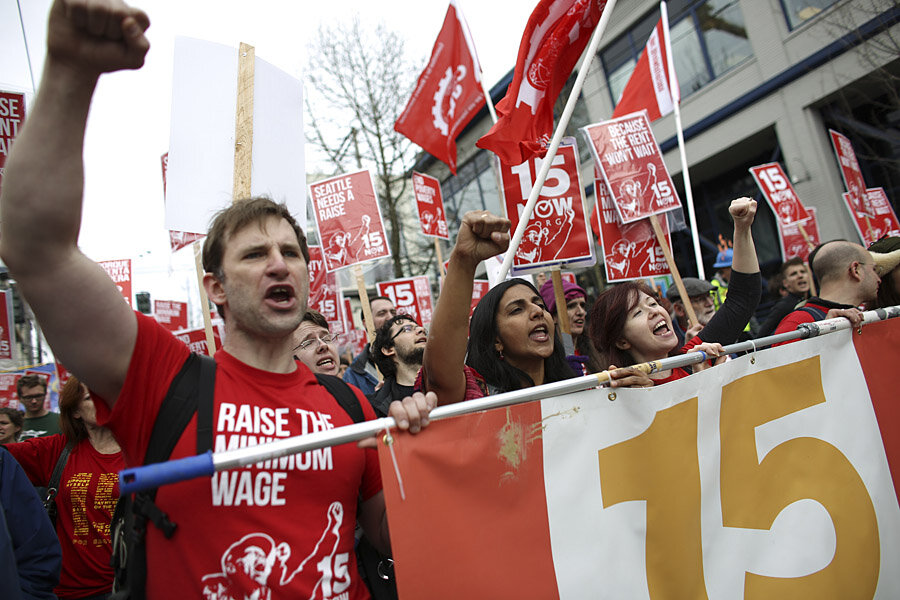The richest get richer, but that's not growing American business
Loading...
I was in Seattle, Washington, recently, to congratulate union and community organizers who helped Seattle enact the first $15 per hour minimum wage in the country.
Other cities and states should follow Seattle’s example.
Contrary to the dire predictions of opponents, the hike won’t cost Seattle jobs. In fact, it will put more money into the hands of low-wage workers who are likely to spend almost all of it in the vicinity. That will create jobs.
Conservatives believe the economy functions better if the rich have more money and everyone else has less. But they’re wrong. It’s just the opposite.
The real job creators are not CEOs or corporations or wealthy investors. The job creators are members of America’s vast middle class and the poor, whose purchases cause businesses to expand and invest.
America’s wealthy are richer than they’ve ever been. Big corporations are sitting on more cash they know what to do with. Corporate profits are at record levels. CEO pay continues to soar.
But the wealthy aren’t investing in new companies. Between 1980 and 2014, the rate of new business formation in the United States dropped by half, according to a Brookings study released in May.
Corporations aren’t expanding production or investing in research and development. Instead, they’re using their money to buy back their shares of stock.
There’s no reason for them to expand or invest if customers aren’t buying.
Consumer spending has grown more slowly in this recovery than in any previous one because consumers don’t have enough money to buy.
All the economic gains have been going to the top.
The Commerce Department reported last Friday that the economy grew at a 4.6 percent annual rate in the second quarter of the year.
So what? The median household’s income continues to drop.
Median household income is now 8 percent below what it was in 2007, adjusted for inflation. It’s 11 percent below its level in 2000.
It used to be that economic expansions improved the incomes of the bottom 90 percent more than the top 10 percent.
But starting with the “Reagan” recovery of 1982 to 1990, the benefits of economic growth during expansions have gone mostly to the top 10 percent.
Since the current recovery began in 2009, all economic gains have gone to the top 10 percent. The bottom 90 percent has lost ground.
We’re in the first economic upturn on record in which 90 percent of Americans have become worse off.
Why did the playing field start to tilt against the middle class in the Reagan recovery, and why has it tilted further ever since?
Don’t blame globalization. Other advanced nations facing the same global competition have managed to preserve middle class wages. Germany’s median wage is now higher than America’s.
One factor here has been a sharp decline in union membership. In the mid 1970s, 25 percent of the private-sector workforce was unionized.
Then came the Reagan revolution. By the end of the 1980s, only 17 percent of the private workforce was unionized. Today, fewer than 7 percent of the nation’s private-sector workers belong to a union.
This means most workers no longer have the bargaining power to get a share of the gains from growth.
Another structural change is the drop in the minimum wage. In 1979, it was $9.67 an hour (in 2013 dollars). By 1990, it had declined to $6.84. Today it’s $7.25, well below where it was in 1979.
Given that workers are far more productive now – computers have even increased the output of retail and fast food workers — the minimum wage should be even higher.
By setting a floor on wages, a higher minimum helps push up other wages. It undergirds higher median household incomes.
The only way to grow the economy in a way that benefits the bottom 90 percent is to change the structure of the economy. At the least, this requires stronger unions and a higher minimum wage.
It also requires better schools for the children of the bottom 90 percent, better access to higher education, and a more progressive tax system.
GDP growth is less and less relevant to the wellbeing of most Americans. We should be paying less attention to growth and more to median household income.
If the median household’s income is is heading upward, the economy is in good shape. If it’s heading downward, as it’s been for this entire recovery, we’re all in deep trouble.






